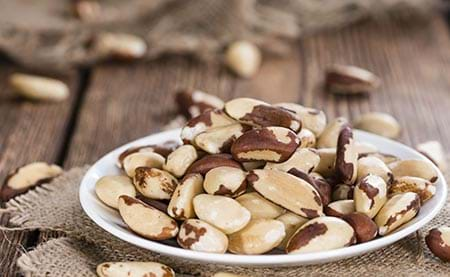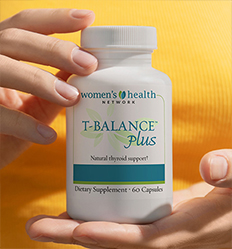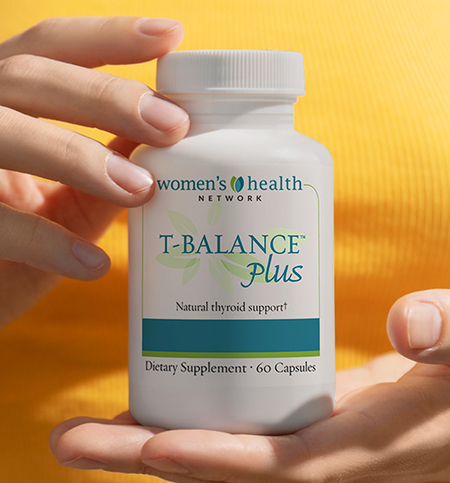By WHN Editors
When it comes to supporting your thyroid through nutrition, there’s a powerful nutrient that you may not know about — selenium. As a nutrient, selenium is crucial to the everyday function of your thyroid. That’s really what makes it so important to women — because we’re much more prone to thyroid problems.

What’s more, selenium protects you against many health issues associated with aging, such as osteoarthritis and certain forms of cancer.
Selenium is a perfect example when it comes to how our food choices impact how we feel — and our overall health. Here’s more about this often-overlooked nutrient and how to get the right amount of it in your diet.
Are your levels of selenium low?
If you’re suffering from the following symptoms, you may have low selenium levels:
- Weakness or pain in the muscles
- Hair or skin discoloration
- Whitening of the fingernail beds
What role does selenium play in thyroid health?
If you have low levels of selenium, it’s harder for the thyroid to make its hormones and for the body to convert thyroid hormones into the form that’s needed by your cells. That’s because selenium is a fundamental component of various seleno-proteins, molecules essential to the body’s ability to create and use thyroid hormones. Their role includes:
- Regulating thyroid hormone synthesis.
- Supporting the conversion of thyroxine (T4, the hormone produced in greatest quantities by the thyroid) to triiodothyronine (T3, the bioactive thyroid hormone that increases our cells’ basal metabolic rate).
- Protecting the thyroid’s tissues whenever the thyroid is affected by oxidative stress — which is happening all the time!
Selenium isn’t only just important to the production of thyroid hormones — it’s also a key regulator of thyroid hormone levels. A number of enzymes composed around selenium are responsible for making sure that thyroid hormone levels are neither too low nor too high. Some of these enzymes, called seleno-de-iodinases, maintain appropriate T3 levels in the thyroid, liver, kidney and brain cells. Another enzyme, glutathione peroxidase, helps to limit T4 when its levels get too high.
Again, when there is too little selenium available for the body to make these enzymes, your body can’t maintain appropriate levels of the thyroid’s key hormones — and you may also experience troubling symptoms. For this reason, selenium is on of the list of key vitamin and mineral supplements for thyroid health.
How selenium and iodine work together
All of the problems that come with selenium deficiency are compounded by the fact that selenium works in tandem with iodine, another nutrient better known for its role in thyroid health. Selenium is responsible for the proper recycling of iodine in the body, so a person with too little selenium as well as too little iodine is much more likely to develop a significant thyroid imbalance. When iodine deficiency goes hand-in-hand with selenium deficiency, it’s essential to treat both nutrient deficits to restore the thyroid to balance.
What foods have selenium?
- Brazil nuts
- Tuna
- Organ meats
- Mushrooms
- Halibut
- Beef
- Soybeans
- Sunflower seeds
Learning more about the nutrients your thyroid needs and the top foods that contain them, can help you support your thyroid more completely.
Are you getting enough selenium?
Selenium is so easy to get through food. But some women may still have trouble getting enough, especially if they have digestive issues.
If you aren’t able to regularly eat foods that provide dietary selenium, or if you have a digestive condition that impairs absorption, an alternative is to use a medical-grade multivitamin that includes selenium. (We don’t generally recommend single-element supplements because a carefully formulated combination better ensures that selenium is correctly paired with appropriate levels of co-nutrients such as iodine.)
Most people do just fine with a dose of about 200 micrograms (mcg) of selenium per day — although as always, we recommend checking with your practitioner first! It’s especially important to have your practitioner continue monitoring your thyroid hormone levels if you’ve ever been diagnosed with any sort of thyroid disorder, such as Graves’ disease (hyperthyroidism), Hashimoto’s autoimmune thyroiditis or any other form of hypothyroidism.
Hatch, C. 2005. Low selenium levels tied to osteoarthritis. US News & World Report, 11/21/2005. URL: https://health.usnews.com/usnews/health/briefs/bonehealth/hb051121a.htm (accessed 09.30.2011).
2 Blot, W., et al. 1993. Nutrition intervention trials in Linxian, China: Supplementation with specific vitamin/mineral combinations, cancer incidence, and disease-specific mortality in the general population. J. NatI. Cancer Inst., 85 (18), 1483–1492. URL (abstract): https://www.ncbi.nlm.nih.gov/pubmed/8360931 (accessed 09.30.2011).
Combs, G., & Clark, L. 1997. Selenium. In: Garewal, H, ed. Antioxidant nutrients and disease prevention. NY: CRC Press.
Clark, L., et al. 1996. Effect of selenium supplementation supplementation for cancer prevention in patients with carcinoma of the skin. JAMA, 276, 1957–1963. URL (abstract): https://jama.ama-assn.org/content/276/24/1957.short (accessed 09.30.2011).
3 Canaris, G. 2000. The Colorado Thyroid Disease Prevalence Study. Arch. Intern. Med., 160 (4), 526–534. URL: https://archinte.ama-assn.org/cgi/reprint/160/4/526 (accessed 10.19.2011).
4 Schomburg, L., & Köhrle, J. 2008. On the importance of selenium and iodine metabolism for thyroid hormone biosynthesis and human health. Mol. Nutr. Food Res., 52 (11), 1235-1246. URL (abstract): https://www.ncbi.nlm.nih.gov/pubmed/18686295 (accessed 10.19.2011).
5 Robin, C. 2007. Iodine Remedies: Secrets from the Sea, 36. Madison, WI: Service to the Good of Life. URL (PDF): www.jcrows.com/MaryJoFahey_IodineRemediesSecretsFromTheSea.pdf (accessed 05.18.2009).
Arthur, J., & Beckette, G. 1999.
6 Kishosha, P., et al. 2011.
Erdoğan, M., et al. 2001. Endemic goiter, thiocyanate overload, and selenium status in school-age children. Biol. Trace Elem. Res., 79 (2), 121-130. URL (abstract): https://www.ncbi.nlm.nih.gov/pubmed/11330518 (accessed 09.30.2011).
Giray, B., et al. 2001. Status of selenium and antioxidant enzymes of goitrous children is lower than healthy controls and nongoitrous children with high iodine deficiency. Biol. Trace Elem. Res., 82 (1–3), 35-52. URL (abstract): https://www.ncbi.nlm.nih.gov/pubmed/11697777 (accessed 09.29.2011).
7 Kishosha, P., et al. 2011. Selenium deficiency a factor in endemic goiter persistence in sub-Saharan Africa. World. J. Surg., 35 (7), 1540–1545. URL (abstract): https://www.ncbi.nlm.nih.gov/pubmed/21523503 (accessed 09.30.2011).
8 Zimmermann, M., & Köhrle, J. 2002. The impact of iron and selenium deficiencies on iodine and thyroid metabolism: Biochemistry and relevance to public health. Thyroid, 12 (10), 867-878. URL (abstract): https://ncbi.nlm.nih.gov/pubmed/12487769 (accessed 09.29.2011).
9 Cai, X-J., et al. 1995. Allium chemistry: Identification of selenoamino acids in ordinary and selenium-enriched garlic, onion, and broccoli using gas chromatography with atomic emission detection. J. Ag. Food Chem., 43 (7), 1754–1757. URL (extract): https://pubs.acs.org/doi/abs/10.1021/jf00055a002 (accessed 09.29.2011).
10 Erdoğan, M., et al. 2001.
Giray, B., et al. 2001.
1 Matelgan, G. 2007. The World’s Healthiest Foods, 780. Seattle: George Mateljan Foundation.
Reference for textbox on symptoms
Matelgan, G. 2007. The World’s Healthiest Foods, 780. Seattle: George Mateljan Foundation.












